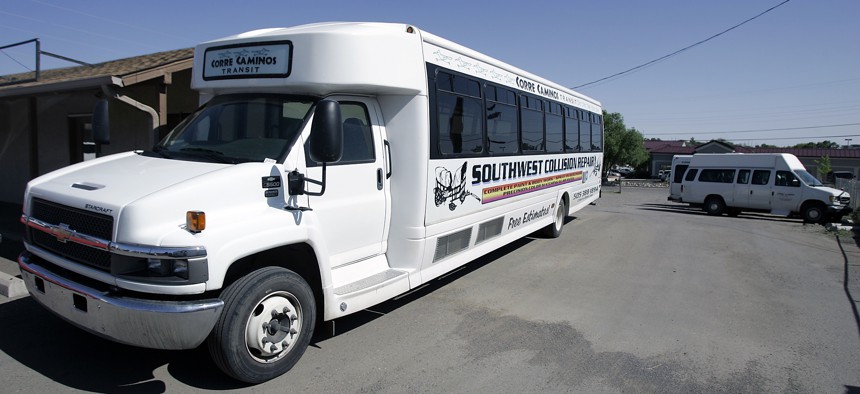Feds Should Take Steps to Help Coordinate Rural Transit Service, Watchdog says

Buses parked at the main terminal at Corre Caminos Transit await their drivers to go on various routes in May 2007, in Silver City, N.M. AP Photo/Ross D. Franklin

Connecting state and local government leaders
The Government Accountability Office says U.S. DOT lacks an adequate strategy for communicating and sharing information about rural transit coordination opportunities and best practices.
Coordination between different transit agencies that serve rural parts of the U.S. can be difficult.
Transit providers in less-populated places commonly face challenges like staff shortages, tight funding, limited technology and long distances between the places where they operate and the neighboring jurisdictions serviced by their counterparts.
These and other related issues are highlighted in a report that the Government Accountability Office issued this month looking at how coordination among the agencies might be improved.
Better coordination, the federal watchdog says, has the potential to reduce costs, to provide new efficiencies and to improve service. That service can be especially important for people who lack the option to drive, such as those who are elderly, disabled or poor.
“Coordination in rural areas can be both essential and challenging because rural transit passengers often need to travel long distances (e.g., 30-100 miles) to reach critical services, such as doctor appointments or grocery shopping,” the report points out.
GAO recommends that federal transportation officials come up with a communication plan to more effectively share information with state agencies and local transit providers about opportunities for greater coordination and best practices for carrying it out.
Over the past three years, the report says, the Federal Transit Administration has allotted about $2.1 billion in grants to support public transportation in rural areas, including tribal lands.
An FTA database lists about 1,500 rural transit providers across the U.S. These organizations, as the GAO report explains, might run buses on fixed schedules, but also provide services that are tailored based on calls for service from passengers.
Even though there are obstacles to coordinating with other agencies, GAO says all of the rural transit providers it interviewed for the report do coordinate trips or schedules to some extent with other organizations in their region.
This might include taking steps like setting common drop-off points or schedules, or aligning service to ease access to places where people go for medical care.
One example detailed in the report involves Rocky Boy’s Transit, which provides transportation on the Chippewa Cree Indians of the Rocky Boy’s Reservation, in Montana.
Rocky Boy’s Transit coordinates transfer points and schedules with North Central Montana Transit to take passengers into Great Falls, Montana, about 100-miles south of the reservation. GAO’s report says that this coordination provides tribal members living in rural areas with greater access to health services, colleges, and shopping.
The watchdog says that the Federal Transit Administration has made some strides in recent years when it comes to assisting rural transit providers with coordination. Even so, GAO says that the transit administration has room for improvement.
“FTA does not have a strategy for communicating and sharing information on coordination opportunities and leading coordination practices for its wide audience of rural and tribal providers, state transportation agencies, and other stakeholders,” GAO says.
The Department of Transportation, which houses the FTA, concurred with some of GAO’s recommendations.
But the department also highlighted its efforts focused on coordination—including an initiative launched last year dubbed Rural Opportunities to Use Transportation for Economic Success. DOT also said it plans to reorganize some of the information it provides online about rural transit coordination.
A copy of the GAO report can be found here.
Bill Lucia is a Senior Reporter for Route Fifty and is based in Olympia, Washington.

NEXT STORY: Easy access to cloud-based disaster solutions



